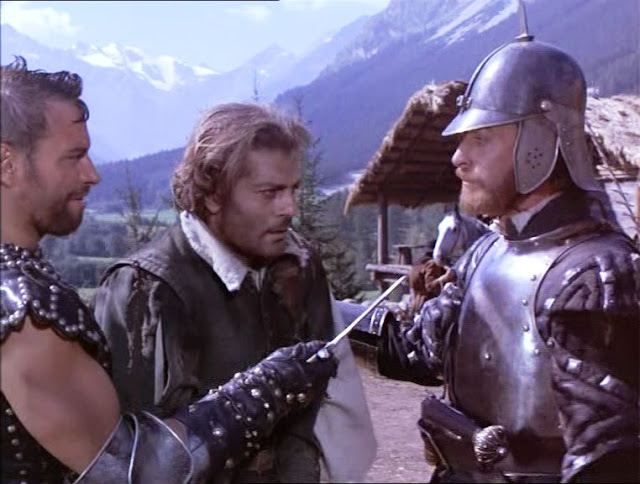
In many ways a far more accurate cross-cultural transcription of The Seven Samurai than The Magnificent Seven, James Clavell’s single film as director, drawn from J.B. Pick’s novel, is one of the few movies to take on the vital historical era of the Thirty Years War, which laid much of Central Europe to waste and completed the work of the Renaissance in burying the certainties of the Middle Ages. Former teacher and intellectual Vogel (Omar Sharif), now a peripatetic survivor, flees the slaughter, plague, and famine that have denuded the landscape. He stumbles into a Tyrolean valley that has remained untouched by marauders, into which he is followed by the company of a hardened, shrewd soldier of fortune known only as the Captain (Michael Caine).

Vogel convinces the Captain that, rather than pillage the farms and torch the hamlet as per the usual practise, the valley offers a safe harbour that will offer his men a fine chance for rest and comfort living off the fat of the land and the flesh of the village females for the duration of winter. The Captain kills off some of the more problematic members of his team, including the bestial ideologue Korski (Brian Blessed), and quells the doubts of the rest, being composed of a disparate array of nationalities and religious creeds whom the Captain must keep tightly leashed to prevent quarrelling – one of their rules is to burn every church, so as to please everyone. He uses Vogel to strike a bargain with the villagers and their most respected, powerful member, Gruber (Nigel Davenport), for amenable treatment, and then appoints him as mediator and judge between the soldiers and villagers.

Vogel and the Captain embody a split between humanist empathy and unemotional expedience, but not without points of accord and growing, if grudging, comradeship. Both men are exhausted of any convincing religious scruples, but are still searching in disparate fashions for values to live by. Both stand entirely divorced from the fanatical local priest (Per Oscarsson, maniacally convincing) who maintains the village has been protected by a holy shrine that he, the residents, and the Catholic members of the Captain’s party will risk mutual annihilation to defend. Gruber indulges the soldiers whilst waiting for his chance, and the rapacious Hansen (Michael Gothard) is given to stirring up trouble, eventually raising a rival band of brigands to contest the valley. Vogel does his best to survive between the fractious parties, romancing remarkably blonde shepherd’s daughter Inge (Madeline Hinde), but haunted by the death of family in the sack of Magdeburg , a battle the Captain participated in, and he describes both that event and the epoch in the curtest of epigrams: “We killed God at Magdeburg

Clavell’s smart, layered screenplay is filled with pithy, memorable lines and sharp twists of story, and he evokes the era in depth and comprehension. The Last Valley bites off almost more than it can chew it terms of taking on such a wide variety of themes and figures to embody them: varieties of religious faith and the loss of it, the nature of power and the frailty of humanitarianism in the face of anarchy, of social responsibility as distinct from intellectual perception, historical politics and institutionalised misogyny. The evocation of a blasted, cruel, evil epoch isn’t as ineffaceable or provocative as that in Ken Russell’s The Devils from the same year (they both sport cast member Gothard, with his gift for portraying multiple varieties of creep) but shares some imagery and mood, combined with high-riding sweep of narrative. As it is, it still stands well above most large-scale films of its time: Clavell admirably avoids the pitfalls that ruined the likes of Clive Donner’s Alfred the Great in trying to evoke a feeling of contemporary parable, and hint at links between the late ’60s counter-culture and similar historical reactions to times of turmoil. Most importantly, it succeeds in conjuring an earthy drama out of the building blocks of the distant conflict it portrays, with the action and characterisation furthering the urgency of the detailed philosophical drama.

Sharif and Caine, both to a certain extent unusually cast, are nonetheless excellent, especially Caine with a light Germanic whistle and utterly convincing glaze of chill pragmatism; indeed the whole cast is intelligent. A particular asset is John Barry’s florid but not overstated score. For the most part only competently directed, The Last Valley hesitates particularly when it comes to action sequences, which are stodgy and ineffectually shot by Clavell, and the very finish is muted and disappointing. This limits the film’s potential to hit rare heights of epic grandeur. With a more experienced and dynamic hand behind the camera, The Last Valley might have been a major classic.

